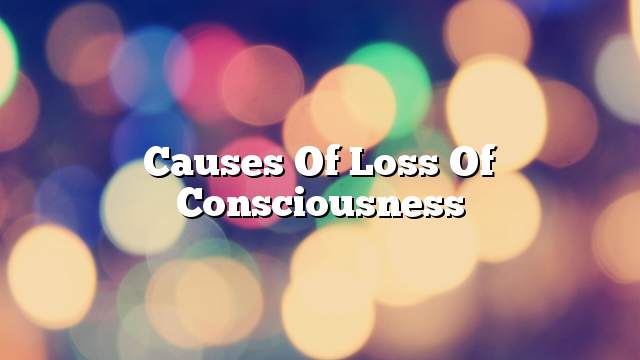Unconsciousness
Loss of consciousness (unconsciousness) is when a person suddenly becomes unable to respond to stimuli and seems to others like a sleeper, and unconsciousness (fainting) is lost for only a few seconds or longer periods.
The unconscious person never responds to loud sounds or shakes, even if he or she may stop breathing or have a weak heartbeat. This condition calls for direct medical intervention. The sooner the person gets the treatment, the greater the chance of responding.
Causes of loss of consciousness
A person may lose consciousness as a result of serious illness or as a result of complications from drug abuse or alcohol use, and for some common reasons:
- Exposure to a car accident.
- Severe blood loss.
- Blow the chest or head.
- Overdose of drugs.
- Alcohol poisoning.
A person may experience temporary loss of consciousness due to some sudden changes in his body. Some of the following causes:
- Low blood sugar.
- Reduction of Blood pressure.
- Nausea (loss of consciousness due to lack of blood flow to the brain).
- Drought.
- Problems with heartbeat.
- Neurological fainting (loss of consciousness caused by seizure, stroke, transient ischemic attack).
- Stress.
- The panther.
Symptoms of loss of consciousness
Some symptoms may indicate that the loss of consciousness is about to happen:
- Sudden inability to respond.
- The weight of the tongue.
- Accelerating heartbeat.
- Confusion.
- Dizziness or feeling of lightness of the head.
First aid for unconsciousness
If someone is unconscious, you should take the following steps to help them:
- If he is not breathing, he should call the emergency immediately, but if he is breathing, he should put his sleeping position on his back.
- Raise unconscious legs about 12 inches at least.
- To reduce the clothing or belts that restrict him, and if the person does not regain consciousness within a minute should contact the emergency immediately.
- Check the person’s respiratory tract to make sure there are no obstructions preventing oxygen from reaching it.
- Check again if a person is breathing, coughing, or moving. These are the signs of the right life. If these signs are not present, cardiac resuscitation should be performed until the arrival of the ambulance.
How To Treat Loss Of Consciousness
If you lose consciousness because of low blood pressure, your doctor will prescribe the medication by injection to increase the pressure. If low blood sugar is the cause, you should take something sweet or make glucose injections. In case of fainting due to some physical injuries, the ambulance and emergency crew must treat the wounds so that the person can regain consciousness.
